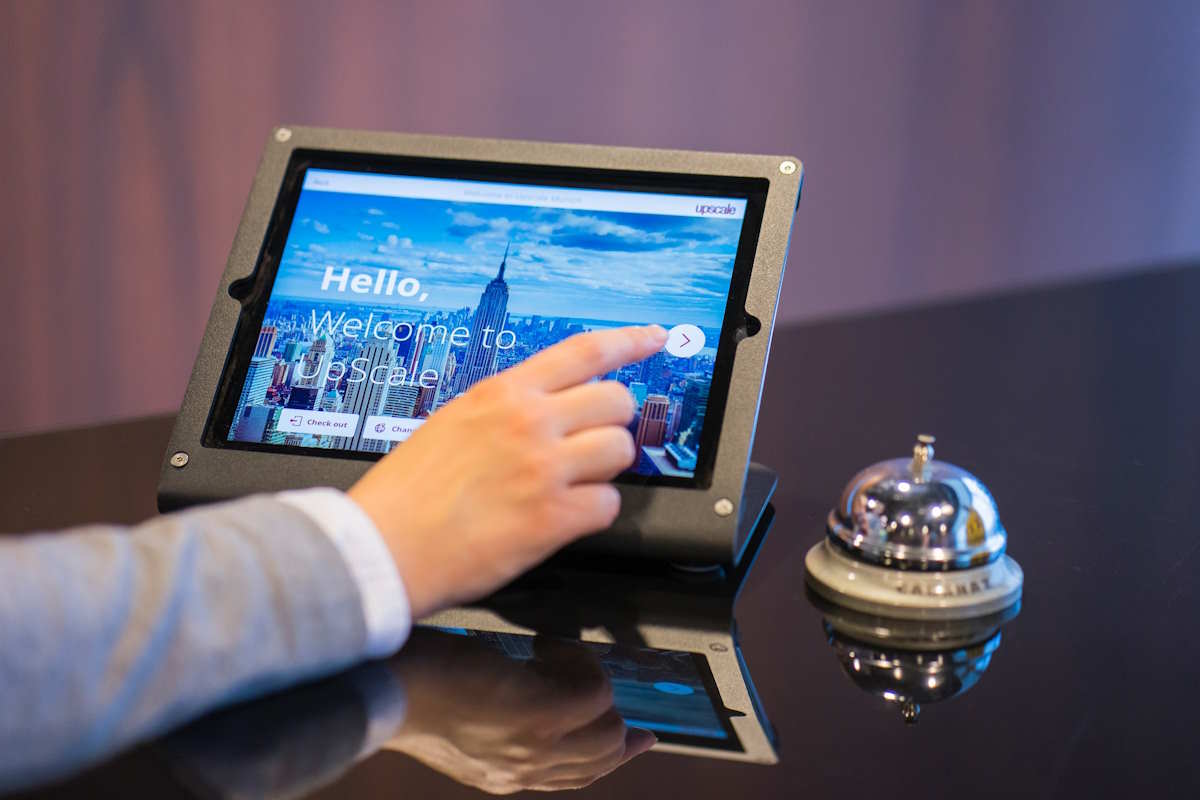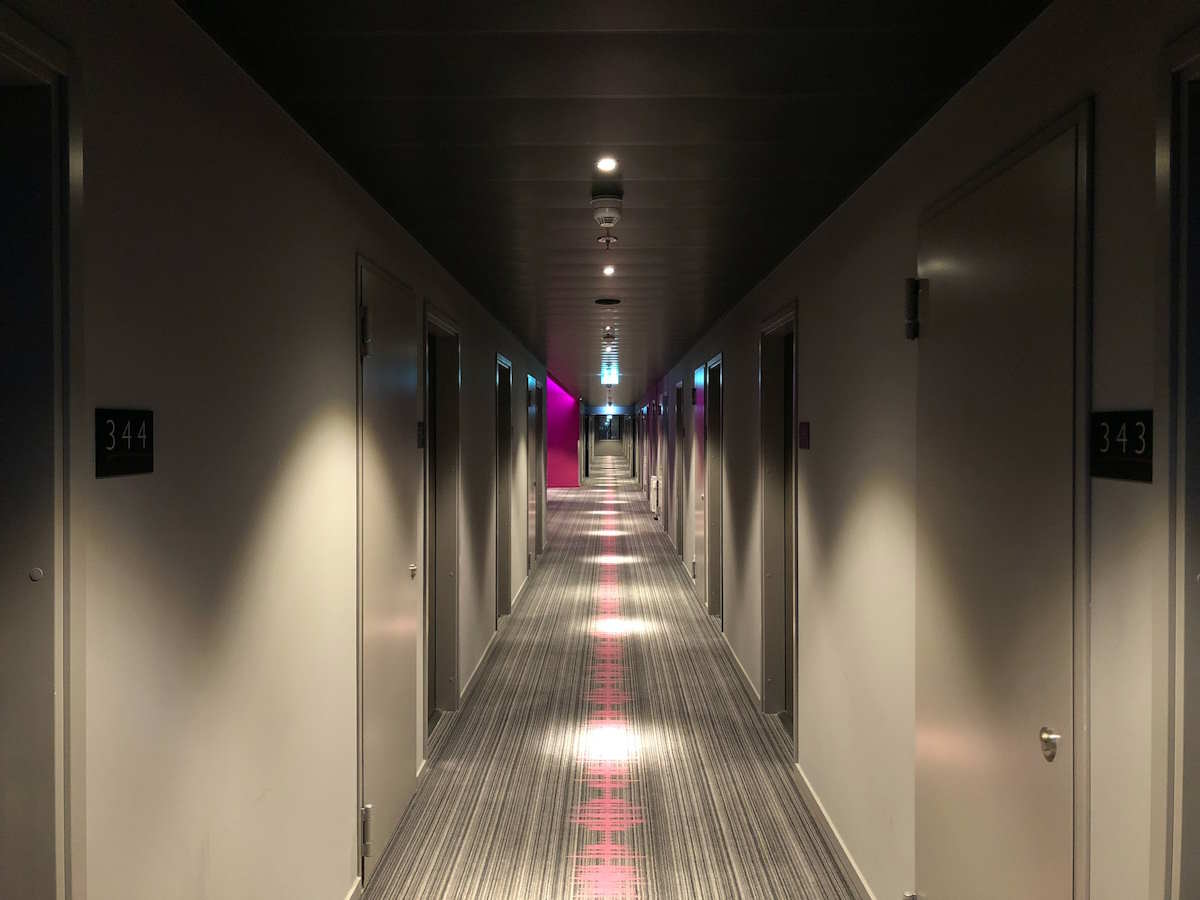The hotel industry, an ever-evolving and dynamic field, has been significantly impacted by the sweeping tide of technology. Today, we’ll embark on a comprehensive exploration of the manifold ways in which technology is catalyzing a revolution in hotel management, promoting enhanced efficiency and excellence. From the digitization of check-in processes to data-driven decision-making, let’s delve deep into the transformative power of technology in the realm of hospitality.

Modernizing Guest Check-In with Mobile Apps
The bygone era of long queues at hotel front desks has given way to a new age of convenience. Welcome mobile apps, the beacon of innovation in the hotel industry, where guests can now check in with a few taps on their devices. This modernization not only saves time but also takes the guest experience to an entirely new level of efficiency and personalization.
Guests can select their preferred room, request additional services, and even unlock their doors – all from the comfort of their smartphones or tablets. The once-tedious check-in process has been transformed into a frictionless and intuitive experience that leaves guests with a lasting impression of efficiency and personalization. Hotel staff, in turn, are better equipped to serve guests and ensure their stay is as seamless as possible, all thanks to these smart apps. Moreover, with a comprehensive hotel property management system, hoteliers can easily manage and track guest preferences and tailor their offerings accordingly. From room preferences to service requests, all can be effortlessly managed with the help of various apps and software solutions, streamlining the entire guest experience.
Empowering Staff with Smart Wearables
Behind the scenes, hotel staff now wield an arsenal of smart wearables, which significantly amplify their efficiency and productivity. Equipped with smartwatches, housekeeping personnel receive real-time updates about room statuses and guest requests. This not only speeds up the cleaning process but also ensures that guests’ needs are met promptly.
Maintenance teams, meanwhile, don augmented reality glasses that provide them with immediate access to vital information and repair manuals. The result? Swift and effective issue resolution, leading to enhanced guest satisfaction. These wearables are much more than just gadgets; they are tools that empower staff to excel in their roles, ensuring that every guest’s stay is as smooth as silk.
Streamlining Housekeeping with IoT Devices
The Internet of Things (IoT) has brought a wave of innovation to housekeeping. In the past, the housekeeping routine was characterized by routine cleaning of all rooms, regardless of their actual occupancy status. Today, thanks to IoT devices, this has changed dramatically. Sensors strategically placed in rooms can detect occupancy, allowing staff to focus their efforts where they are needed most. This not only saves time and labor but also reduces wear and tear on rooms that do not require daily cleaning, leading to cost savings for the hotel.
Furthermore, IoT devices enable smart thermostats and lighting systems to adjust room conditions based on guest preferences. Imagine entering a room where the temperature, lighting, and even window shades are set exactly the way you prefer, all based on your previous stays. IoT takes the concept of guest comfort to an entirely new level, leaving guests with an unforgettable impression of the hotel’s commitment to their well-being.
Enhancing Guest Communication with Chatbots
In a world where instant gratification is the norm, guests have come to expect rapid responses to their queries and requests. Enter chatbots, the friendly and efficient AI-powered assistants that provide 24/7 support. They can answer common questions, assist in booking reservations, and even offer local recommendations, all with a rapid response time that ensures guests feel valued and heard.
What’s even more impressive is that chatbots are not just responsive; they are also capable of learning. As they interact with guests, they gather valuable insights, enabling the hotel to continually improve its services and fine-tune the guest experience. While chatbots take care of routine and repetitive tasks, hotel staff can allocate more time to complex guest needs, fostering a heightened sense of hospitality.
Personalizing the Guest Experience with Big Data
Today’s guests are not just looking for a place to stay; they’re seeking a unique and memorable experience. This is where big data analytics come into play, acting as the behind-the-scenes wizard that transforms ordinary stays into extraordinary ones.
By collecting and analyzing guest data, hotels can provide tailored recommendations and offers to their guests. Did you enjoy a sumptuous steak on your last visit? The hotel might offer you a reservation at their renowned steakhouse for this stay. This level of personalization extends to room upgrades, in-house dining choices, and even special amenities. It’s as if the hotel already knows your preferences, creating a warm and familiar atmosphere that resonates with guests on a deep level.
Moreover, big data enables hotels to forecast peak occupancy times, helping them employ dynamic pricing strategies. By optimizing room rates based on demand, hotels maximize their revenue while offering guests the best possible value. It’s a win-win situation where guests feel they are getting a good deal, and the hotel enjoys increased profitability.
Energy Efficiency and Sustainability with Smart Controls
Sustainability and energy efficiency have become significant concerns for both hotel guests and owners. A responsible approach to resource management is not just environmentally friendly; it’s also cost-effective. Smart energy management systems are the cornerstone of this endeavor, allowing hotels to monitor and control their energy usage in real-time.
These systems provide a comprehensive overview of energy consumption, allowing hotels to fine-tune their operations. For instance, they can optimize heating, ventilation, and air conditioning (HVAC) systems, ensuring that rooms are at the ideal temperature for guest comfort while avoiding unnecessary energy waste. Lighting systems are another major focus, with smart controls ensuring that lights are turned off in unoccupied rooms, contributing to energy savings.
In addition, these systems often extend to the management of hot water consumption, a significant factor in a hotel’s energy footprint. By optimizing the operation of water heaters and recirculation systems, hotels can reduce their environmental impact while lowering operational costs. This dual benefit of sustainability and cost savings is a clear win-win for both the environment and the hotel’s bottom line.
Digital Concierge Services for Convenience
The digital concierge is the ultimate convenience at a guest’s fingertips. These services, accessible through smartphone apps or in-room tablets, serve as an all-encompassing guide to enhance a guest’s experience.
Guests can access a wealth of information about local attractions, dining options, and events, all from the convenience of their mobile device or in-room tablet. Want to reserve a table at the hotel’s renowned restaurant or book a relaxing spa treatment? The digital concierge has you covered. Even simple requests like a wake-up call or room service can be made effortlessly. These digital concierge services offer a seamless and hassle-free stay, where guests are in control of their experience and can tailor it to their preferences.
Leveraging Blockchain for Security and Trust
In a world where data security and trust are paramount, blockchain technology has emerged as a formidable ally in hotel management. This technology ensures the integrity and security of guest data, providing a transparent and immutable ledger of all transactions.
Through blockchain, hotels not only secure sensitive guest information against the growing threat of cyberattacks but also foster a deep sense of trust among their clientele. Guests can rest assured that their personal and financial information is stored safely and transparently. This element of trust is a priceless asset in an era where data breaches and cybercrimes are becoming increasingly common.

In conclusion, technology has ushered in a new era of efficiency and excellence in hotel management. From streamlining check-ins to personalizing the guest experience, and from enhancing staff productivity to boosting sustainability efforts, technology is revolutionizing the way hotels operate. With the ongoing integration of innovative solutions, the future of hotel management is set to be even more exciting, with a central focus on delivering exceptional experiences to guests while maximizing efficiency and sustainability. The journey of transformation continues, promising a brighter and more efficient future for the hospitality industry.